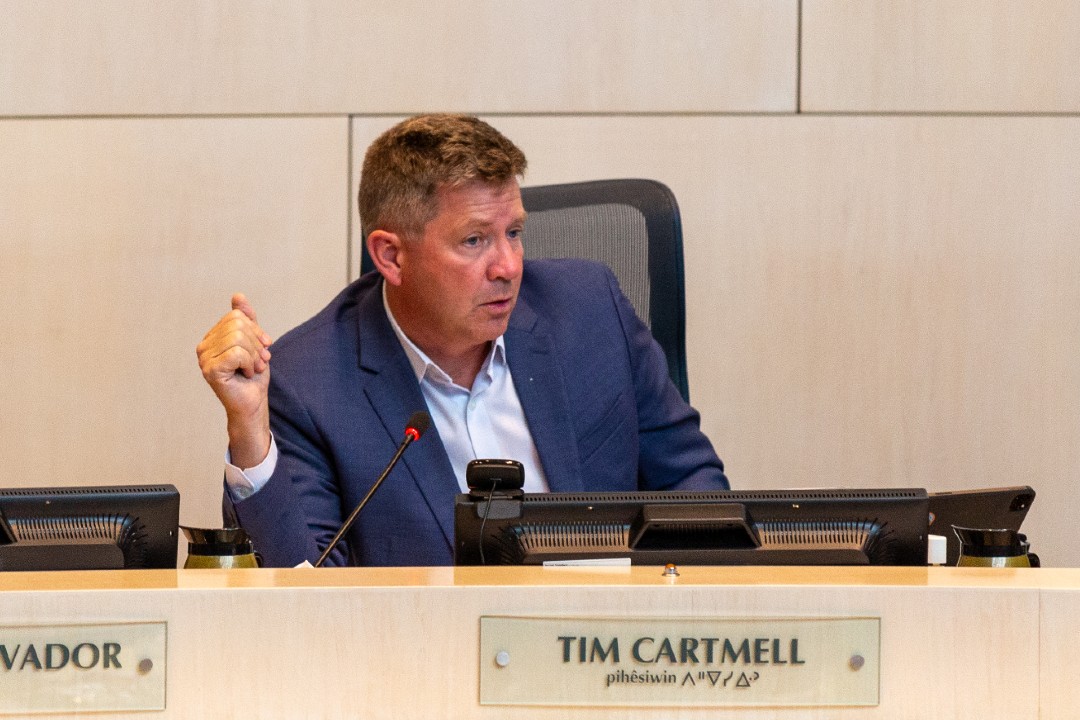An Edmonton city councillor wants to use data to track whether homeless-serving organizations that receive city money are improving people's lives, but some in the sector question the effectiveness of more data collection and reporting.
Coun. Tim Cartmell said there needs to be proof that the social service agencies in the city are effective and efficient because they are partially funded with public dollars.
"There's some need, I feel, for some formalized data collection so that we can aggregate it, so we can know what we're doing and know how to evolve," Cartmell told Taproot.
Edmonton's finances are in a tough state. Recently, city council approved an 8.9% property tax increase for 2024. Cartmell said public pressure to cut costs is significant but, without data, he struggles to point to the work social service agencies perform and say that it's important. "Intuitively, it's important," Cartmell said. "Pragmatically, I can't prove that our investments are meaningful."
In 2023, Cartmell asked city administration to prepare a report that detailed all homeless-serving social agencies in the Boyle Street, McCauley, and Central McDougall neighbourhoods, the services they provide, and the municipal funding they receive. The resulting report said the city provides or has committed $22.2 million from 2022 to 2026 towards 10 of the 17 homeless-serving organizations in the area through various funding streams.
Cartmell suggests several metrics could determine if such services are effective. He proposes measuring whether a person using a service can progress from accessing crisis-level services to a situation where they have secure housing, a job, and access to mental health care. He also proposes surveying clients to determine what services they access and why. "Who is seeking what, why are they seeking it, and what agencies are being avoided?"
In countless discussions at city hall, many of Cartmell's council colleagues have questioned whether homelessness, mental health, and addiction are even in the city's jurisdiction, or if the province or federal government should step in rather than the city.
Cartmell, however, thinks collecting more data can help curate a less adversarial conversation. "Right now, I think we're exchanging opinions and subjective views. But if we can actually point to solutions that actually work and actually move people forward in their life journey, we can then turn to the province in a data-informed way to say, 'This works.'"
But collecting this type of data could be redundant, time-consuming, and misleading, said Susan Morrissey, executive director of the Edmonton Social Planning Council.
"I get it, there's the desire to want to ensure that (with) any money that the city is spending there's an accountability loop, and there's a way to be able to make sure that agencies and organizations that are receiving funding are actually using it for the purpose it's supposed to be used for and then are showing some sort of results," Morrissey said.

Coun. Tim Cartmell wants to figure out how the city can track the success of social services. (Mack Male/Flickr)
The council collects data on the well-being of Edmontonians through the annual Vital Signs report along with the Edmonton Community Foundation.
Morrissey pointed out that many agencies receive funding from different levels of government, as well as through private donations, which complicates things.
Further, Morrissey notes that organizations funded by the city's family and community support services (FCSS) program already must report on certain outcomes. For example, for programs that aim to prevent homelessness, the programs may report on whether participants demonstrate skills in financial literacy. The FCSS primarily funds preventative programs, not the emergency programs that are concentrated in the inner-city neighbourhoods.
"As it stands, agencies collect an awful lot of data and report an awful lot of data. If you're asking us to collect more data and report it, to what end?" Morrissey said. "And is that the most effective use of resources?"
Much of a social service's work can be hard to quantify, Morrissey said. She explained that a trackable metric could be whether a person gets a job. "But what about the person who did not get the job, however, through their involvement in this process built confidence, built networks, and other what we would call softer skills, and as a result that was very important and actually very beneficial? That's the part of numbers that doesn't get transferred very well."
Morrissey noted that in the City of Edmonton's 2023 budget, 6.7% of tax dollars went to social services, which is half of what went to the Edmonton Police Service, the largest line item. "I understand and appreciate wanting to be able to make sure that the money is used well and that we're seeing results," she said. "Is policing services also going to be held to the same accountability?" (Council is indeed pushing to review the police's auditing priorities, but the Edmonton Police Commission recently declined to release its 2024 audit plan.)
Cartmell said he wants to speak to social service operators for their thoughts on his proposal, and that he is working with fellow councillors to prepare a motion to further this work. "When this comes up at council (the motion will begin to) drive whatever change we need to better understand, better evaluate, better support and fund, better analyze, better organize the social services so that people get what they need, so we're making the right investments so that (we) actually get people what they need," Cartmell said.
The motivation isn't to shame the social services, Cartmell said, but to demonstrate to taxpayers that their dollars make a difference.
As for what might happen if a service is deemed inefficient or ineffective, Cartmell said he didn't know if council as a whole would consider cutting an agency's funding, but "there's real questions being asked."
